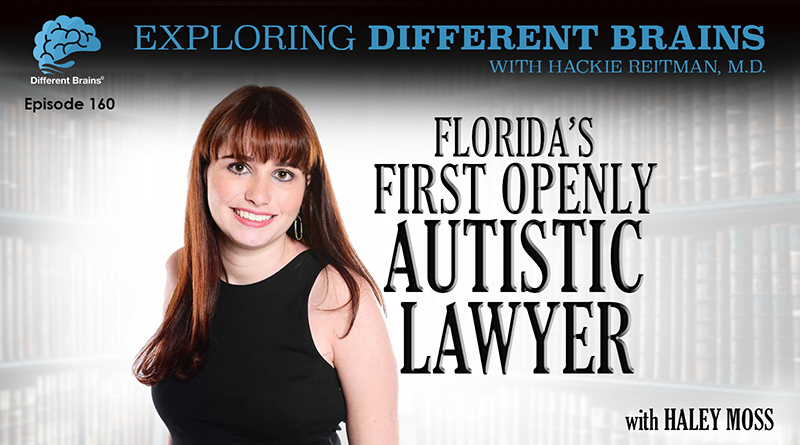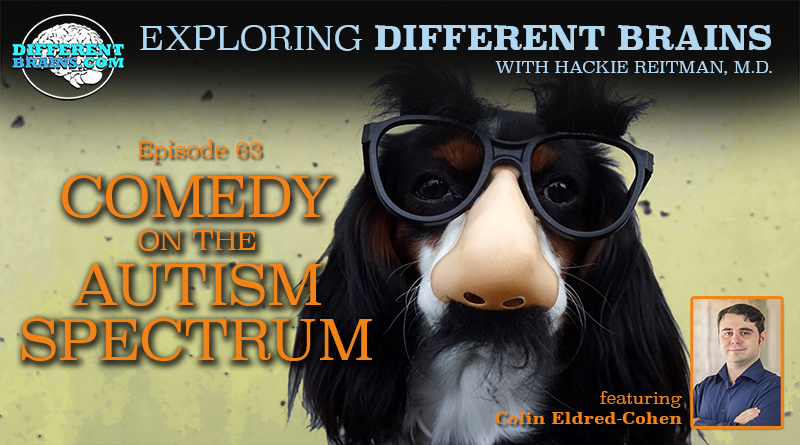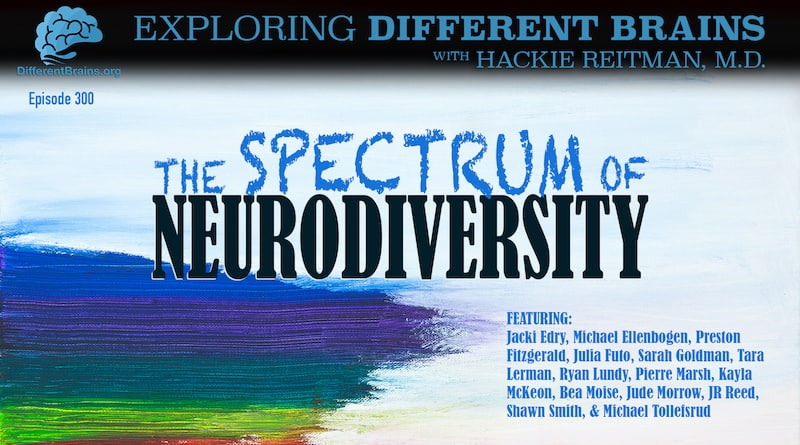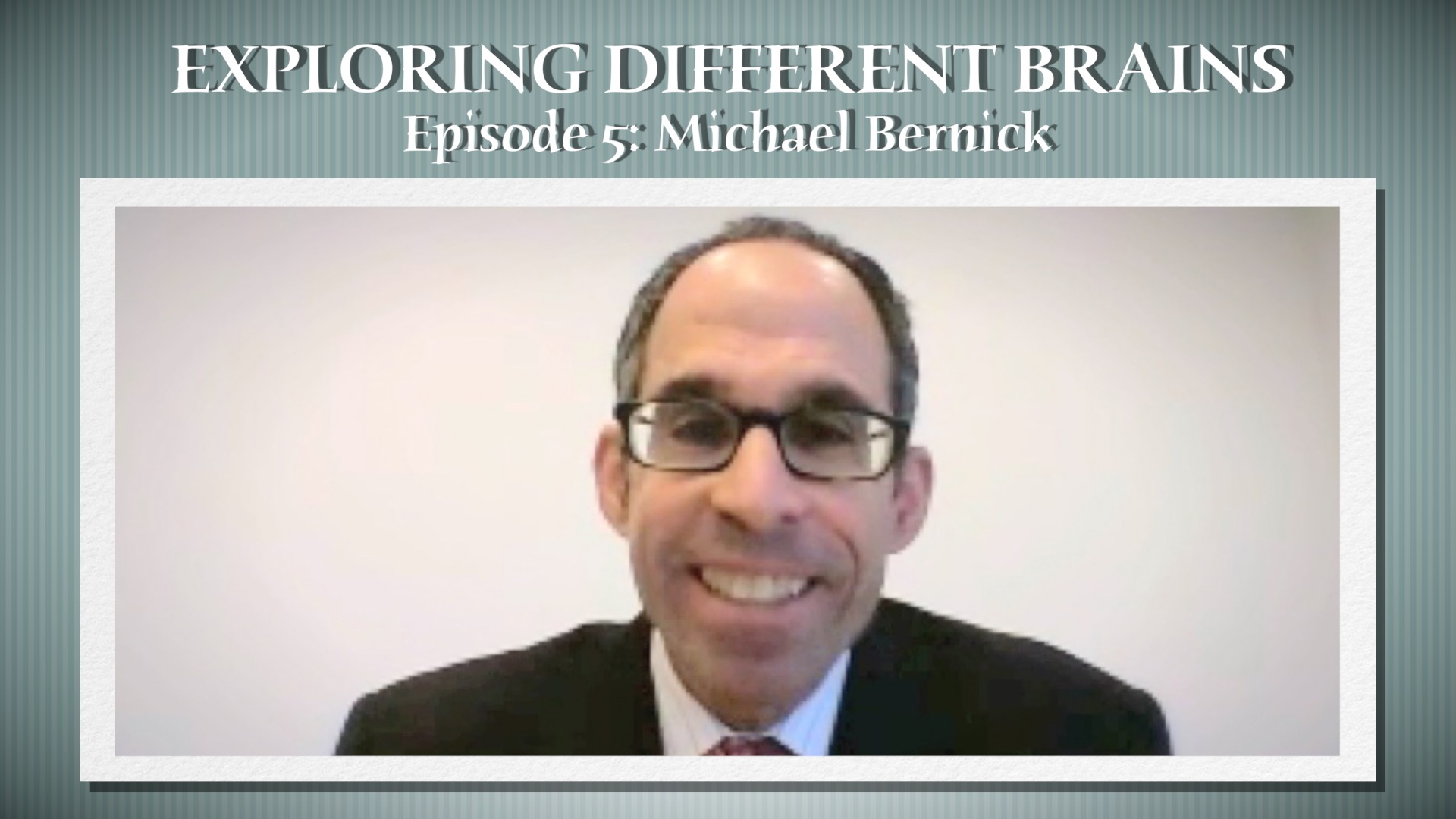
Florida’s First Openly Autistic Lawyer, with Haley Moss | EDB 160
In this episode, Dr. Hackie Reitman speaks with Haley Moss, the first openly-autistic lawyer in Florida.
(18 minutes) Haley is an artist, author and autism self-advocate. She is a graduate of the University of Miami School of Law, and was just admitted to the Florida Bar in early 2019. She is also a renowned visual pop artist, and the author of Middle School: The Stuff Nobody Tells You About and A Freshman Survival Guide for College Students With Autism Spectrum Disorders. Haley discusses how she found out she was on the spectrum, what made her decide to go into law, and gives advice to other people with autism that are working to pursue their goals.
For more information about Haley, visit: HaleyMossArt.com and HaleyMoss.net
For information about Zumpano Patricios, the law firm Haley practices at, visit: www.zplaw.com
To listen or download the podcast version of this episode, see the embedded player below.
Or look for us on your favorite podcast provider:
iTunes | Stitcher | SoundCloud
TRANSCRIPTION
[expand title=”View Full Transcript”]HACKIE REITMAN, M.D. (HR): Hi, I’m Dr. Hackie Reitman, welcome to another episode of exploring different brains, I’m very excited today because we have as a guest, Haley Moss, and she is quite the attorney, but wait till you hear her story! And without further ado, I’m going to let Haley introduce herself!
HALEY MOSS (HM): Hi, Hackie, and hi everybody; thank you so much for having me on Exploring Different Brains! My name is Haley Moss, I am an attorney as Hackie mentioned, I’m on the Autism spectrum myself, I was diagnosed at age three. I recently graduated from the University of Miami law school back in May, I passed the Florida bar exam, just began practicing law here in coral gables Florida, and that’s a little bit about my professional career, outside of that in Autism advocacy, I’ve written two books. I am an artist and I love getting to talk to people and share my experiences through writing and speaking and just connecting with others.
Choosing a law career
HR: What don’t you do? You’ve got a pretty full dance card there! Why did you choose law?
HM: I chose law because I wanted to be able to make a difference, and I thought that I’d be able to do that because I realized that there’s a lot of things to be done in terms of policy, in terms of families, in terms of just everything is that law is something that really affects our lives and it also is a field that plays to things that I enjoy, I love to write and I love to talk and the legal profession is a lot of writing and a lot of speaking.
HR: Tell us what are some of the obstacles that you encountered along the way.
HM: Where to start, that’s the real question! I was non-verbal when I was first diagnosed. I didn’t start talking until I was 4; that’s a good place to start and a lot of the things that are hard for me right now usually are socially and independent living skills and executive functioning so knowing when to start tasks, how to stay on tasks, keeping things organized, so even though we say I do a lot, it’s really hard for me to keep everything straight, I find myself making a lot of lists: writing everything down, and try to figure out what the most important thing at any given time is, so sometimes it’s really hard for me to figure out my schedule, prioritize, things of that nature, too. So, one thing at a time.
Writing about autism
HR: What led you to write “Middle School, the stuff nobody tells you about”, that book.
HM: What led me to write about Middle school is -here’s the story. When I was 13 years old, I was invited to speak on a panel at the Autism Society of America Conference, which was in Orlando at the time, and on this panel, there were four of us. I was the only girl, and I was the youngest one, I had just finished the eighth grade. So, getting ready to go to High School and speaking on a panel in front of an audience, you know, a little bit intimidating, but I was just telling my story, and people really liked what I had to stay and somebody in the audience asked me about how I found out that I was on the Autism Spectrum, how did I know, something of the like. Because it’s not normal to see a 13 year old tell her story, so I explained to the audience how I found out at age 9, and I found out because my parents explained it to me like Harry Potter, because at the time, I was obsessed with Harry Potter! So Harry Potter is not like the muggles because he has magic and all the stuff like that and, he didn’t really fit in with his family that he lived with, because he had magic and was going to be a wizard! And my mom explained that just because Harry was different doesn’t mean he was less, he was just different, and as we saw in all the books and movies, Harry was really cool! So I could be extraordinary just like Harry Potter, so even just explaining that Autism for me was always a very positive experience, and at that conference was how I actually was in touch with APC who published the Middle School book, and being someone who just finished Middle School, and went to three schools in three years, I had a lot to say!
HR: And now, if we fast forward to your next book, tell us what led up to that.
HM: There was nothing out there for college, everything that was out there for college was written by professionals, there was nothing out there that was by autistic people for autistic people, it really was all for the parents, or written by parents, or written by professionals; And there really wasn’t a road map, and as we’re noticing as well as you know how with autism focused on kids on the spectrum; so little kids and adolescents and teenagers, there’s not that much for adulthood and higher education. So I was realizing, there is so much I am able share and transitioning to college is hard for anyone it doesn’t matter who you are, going from possibly living at home and being a high school student, to getting to go be a real adult living in dorm or move away or have to balance a schedule and maybe even do laundry for the first time! It’s a lot to get used to, and there’s just so much, that I wanted to be able to hopefully make it easier and be both a resource and a friend to those who were thinking about college in their future, especially those on the Spectrum to know that one, it’s possible because somebody else did it, and two to hear wisdom and a little bit of guidance from somebody who went through it, because I look at it when I write, and I wrote that book, I looked at it as “what if I sucked?” I wouldn’t have wanted to hear, what would- I would’ve wanted to hear a year ago, because I started writing that book during the end of my freshman year, so i was thinking, “What would I have liked to know about a year ago?” And that’s the information I wanted to give.
Working in healthcare litigation
HR: How did you choose the firm that you are with?
HM: I chose where I’m at because I actually got extremely lucky. I met one of the former partners at my firm, I hear chance, and we just connected instantly. They brought me in for an interview. I got along really well with everybody; the managing partner at my firm has a son on the Autism spectrum as well, so we got along really quickly, and had something to connect with and everybody where I work is very pro Neurodiversity, very excited about it, so I feel very accepted, I worked there my second summer in law school; so the summer of 2017, so I knew who I’d been working with, where I would be working, I knew a lot about it from being a Summer associate, and I knew after that it was a great fit. So I was very excited to get started once I got to begin doing official lawyer stuff.
HR: What kind of law do you practice?
HM: I work in healthcare litigation.
HR: What drew you to that?
HM: What drew me to healthcare is that healthcare affects everybody, and as we know that there are different issues with people with disabilities and healthcare so I realized that it just affects every aspect of our lives, and I just think healthcare is super interesting. I’m learning a lot and that’s honestly at this point in my career I’m really excited to learn and be apart of a team and just know more about the practice of law as well.
HR: And tell our audience the name of the firm that you’re with.
HM: I work at Zufano Patricious.
HR: Great. And what is their website?
HM: zplaw.com
Haley’s Art
HR: Oh, cool, glad they made it short! Let’s change topics a little bit, let’s talk about your art!
HM: I love talking about my art! You can see I actually have some of it behind me, because I have no shame in decorating my own apartment with my own work. It makes me happy and I get that a lot about my artwork is that it makes people happy, because most of it like the stuff behind me actually, is very bright and colorful, I just have a very black and white grey theme going on in my living room, so that’s why I have some black and white pieces in my background. But I actually love using color, I love doing this popart meets anime type stuff, because I realized it makes people happy. I’ve always loved that stuff, because I’ve always been very inspired by artists like Eric Brado, Peter Max, anything with lots of color, and I realized that colors are a great way to get to make people happy too, and a lot of what I do with my art as well is I love to be able to donate it to different causes in order to help raise money for those with autism, their families, other disabilities; I love being able to give back. So, especially with art because for me, it always helped me de-stress and kind of disconnect from the stress of being in school, or something else in my day-to-day life. So it always made me happy to create and knowing that my work can make somebody else happy, was really awesome, and also being able to have proceeds go to an important cause or mission made other people happy, so it made everybody happy all at once which is so so cool.
Advice for people with autism
HR: That is cool, that is very cool! What is the biggest piece of advice you might give to someone in our audience whose on the Autism spectrum?
HM: I think the biggest piece of advice I’d like to give, is first, be proud of who you are, there’s nothing bad about being autistic. I mean, it’s not always easy, I’m not here to say that your road is going to be sunshine and roses, but I do want to say that you have a very unique perspective of how you see the world, and- it’s beautiful, nobody can take that away from you. That being said, you all, so unlike a lot of other people, are probably incredibly self aware. So you probably know your strengths and weaknesses better than anyone else, and in that case, I’d say explore your talents, know what makes you who you are, and embrace it.
HR: How can our audience learn more about you?
HM: You can visit my website at haleymossart.com, you can also follow me on social media: so I’m on Facebook, Twitter, and Instagram, also at #HaleyMossArt.
HR: Haley, is there anything we haven’t covered that you’d like to discuss?
HM: I think we got through quite a lot of stuff!
HR: Do you do any creative writing?
HM: Ok, I mean I do write autism stuff for other publications, so I’ve written for places like Huffington Post before, but as far as creative writing and fiction, I write poetry, but I don’t really publish it or share it too much.
HR: And what is the poetry about?
HM: Honestly for me it’s just sometimes a way to put thoughts on paper, that I don’t know how to make sense of, and sometimes just because it feels good.
HR: Now, what are your other interests?
HM: Outside of autism world and being an attorney, I love getting to just spend time with family, I love getting to do art as you know, I actually very recently began my fitness journey, so I love getting to go work out and spend time in studios with other people, something I geek out about a little bit too. I love reading, I love hanging out by the pool; probably one of the greatest things in Florida is it’s nice out all the time, so I’m quite the pool bum when I have a bit of free time.
Autism and the law
HR: What’s one thing people with autism should know about the law.
HM: That there are safeguards to protect you, I don’t practice in the areas ADA or disability law, but there are certain aspects of legislation that I do know about, such as the IDEA in education, section 504 and the ADA so all of those interact with your life and can actually help you.
HR: You know, the way I’m seeing it is that all of these different silos, you know, autism here and Down syndrome there, and then you have Alzheimers over here, and you have PTSD and mental health issues; many of the same tools and many of the same challenges are in all of these silos so we’re all trying to get everyone to play nicely in the sandbox.
HM: I absolutely agree with that, I am not a fan of the “my disability can beat up your disability” type attitude that some people think that everything is very separate- everything is together, especially when we talk about the law, is all of these different safeguards so people won’t discriminate based on your disability.
For autism parents
HR: What advice do you have for parents who’s child may be on the Autism spectrum?
HM: It’s to just be supportive. I am very lucky that my parents are my biggest cheerleaders. I know not everybody feels that way about their parents. But my parents are my biggest cheerleaders. I’m super close with my family, I love them to death. I would not be talking with you if it weren’t for the time they spent with me, the interventions, the support, the love, all of that good stuff. So, one thing my parents did that I also love is one Neurodiversity and autism is always seen as a strength and not a weakness in my house, and we also said to explore talents, and I was encouraged to explore things I was interested in and loved. So, even just being able to explore, I think in letting your kids explore and giving them the tools to explore their talents and gifts to this world is so important and you’ll be constantly surprised and amazed by what you find.
HR: Do you have any siblings?
HM: I’m the only kid!
HR: Oh your the only child? Ah, that’s a good job if you can get it.
HM: It’s a great job! It’s also been fun sharing with dogs my entire life, because we always had a dog.
Challenges going forward
HR: What do you consider your biggest challenge going forward?
HM: For me, I’m still obviously transitioning into having a full-time job and not being in school. It’s still really weird school not being in school sometimes, because I still have friends who are at school, and I also- I’m around the university sometimes because it’s not too far from me. So even just- not being in school is kind of a little bit of a challenge, it’s like, “ok yeah, I don’t have homework to do when I get home”, and you know that’s pretty cool, I’m not going to lie. But it’s also “ok, here’s what I have to do at work” here’s a lot of that is challenges being able to prioritize what’s important and getting into a new routine which, you know that obviously started a new job, starting a new school, are all huge transitions in life, and for someone on the spectrum, transitions are always a lot bigger feeling, even if it’s something small to a neurotypical person, it’s still pretty big for us so, even just finding that rhythm everyday is alittle bit of a struggle. But I’m getting there!
HR: Tell us more about your Huffington Post articles.
HM: I started writing for the Huffington Post while I was in Law School. Needless to say it made me very interesting at law school, and I wrote about college, I wrote about, just experiences with being autistic. I like to write about media representation issues that affect adults on the spectrum, things like that is giving perspective to people who don’t normally get perspective on what affects us and different outside looking in type of thing. So, a lot of pieces that we read are usually by parents or professionals. So it’s a lot different seeing an opinion from somebody who lives it every day, and I feel like there’s a lot that people can learn from that too.
HR: For those in our audience who might want to- because they get so inspired by you, try to write for The Huffington Post, how did you go about that?
HM: I just was very happy to be able to share, and I like to write what I’m thinking and I also think the best way to be a writer especially with columns and opinions, it’s just something that I preach is write the way you talk to somebody, you don’t have to make it overly complex, and I’m learning this as well in the practice of law. I was talking about this with a colleague the other day. You don’t have to make things sound complicated, you don’t have to use big words to make yourself sound smarter. People generally want to be able to read something that they’re going to understand, and I realized that’s kind of our job as well, is to break things down in a way that you can understand it. So, I always- even when I was in law school, my thing is if I can’t explain this to someone who has never set foot in this profession, if I can’t explain what I did, what I can do or what I haven’t learned to someone who has no clue what they’re doing, then I’m not doing it right. So with writing is to write how you would talk to a friend or a family member, if you want to tell your story, it’s tell it in a way that makes sense, tell it in a way that somebody can understand who might not have the same background as you, or the same level of education as you do.
HR: Very good advice. Tell us what you like to read?
HM: I actually love to read fiction. I love young adult novels, I love all that drama. I might not have liked being in High School and dealing with the drama, but it’s fun to read. So I really like series like thousand floor, I love Jodi Colt books, I love just reading. I love to read whatever I can, I try to go for the New York Best Sellers, they usually think there’s interesting stuff. And every once in a while I’m interested in when there’s the occasional Autism fiction that came out, so the kiss quotient came out a couple months ago, and it was a romance story about a woman on the spectrum, and the author was on the spectrum, so it was a really interesting read for me. I didn’t get a chance to do a formal review of it or anything, but it was something that I did think was very interesting to see our own voices type fiction.
HR: Hayley, thank you very much for being with us today here at Exploring Different Brains. Wanna wish you the best of luck in your law career and we do hope you’ll find time to come back with us again, thank you so much.
HM: Thank you so much!
[/expand]



